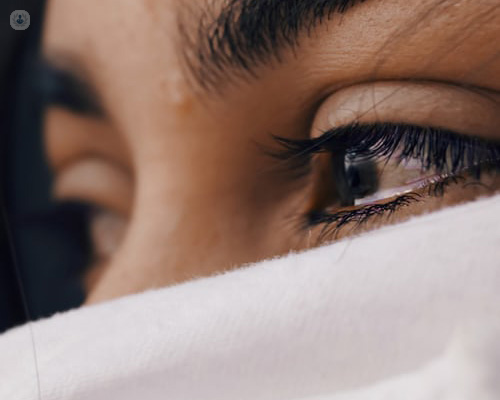Watery eyes: what does this mean?
Escrito por:Watery eyes (or epiphora) is a condition where either too many tears are produced or they cannot drain away properly which, for some, may be an embarrassing problem, especially if it looks like you are crying! Fortunately, one of our top ophthalmologists Professor Harminder Dua CBE is on hand to explain the possible causes of watery eyes, how much water is normal and when it might be time to see an eye specialist.

What is the purpose of the ‘water’ in our eyes?
Tears are a normal function of the eyes. The water that keeps the eyes wet is a complex fluid, made of many different chemicals. The purpose of these chemicals is to kill bacteria, nourish, protect and wash the eyes. It gives the front surface (the cornea) its final polish to focus light accurately to allow for clear vision.
What are the causes of watery eyes?
The possible causes of watery eyes may include:
- Excessive production of tears
- Blocked tear ducts (the small tubes which the tears drain into)
- Abnormal eyelid position
- An allergy or eye infection (such as conjunctivitis)
The symptoms that may present with watery eyes include blurred vision, sore eyelids, redness and general discomfort.
Under what circumstances is it normal to have watery eyes?
It is normal for your eyes to water when you are exposed to cold wind or when you are peeling onions. This is due to the excessive production of tears and it is only a short period of time before they resolve on their own.
How are watery eyes treated?
For anyone who experiences watery eyes where the fluid is sticky, there is discharge, or they are associated with red and sore eyes, I would recommend that they see an eye care specialist.
Watery eyes can be treated by an ophthalmologist who would probe the blocked passage (especially in infants), using surgical procedures that ‘unblock’ the passage or create an alternative path for the fluid to flow.
What is the best way to clean my watery eyes at home?
I recommend that you dab any excessive tear fluid that overflows on to the lower lid and cheek with a soft clean tissue. Wiping with a sideways movement can rub the cells off the wet skin of the lids and make them sore and irritable.
Do not hesitate to book an appointment with Professor Dua now, if you are concerned that you are living with watery eyes.


